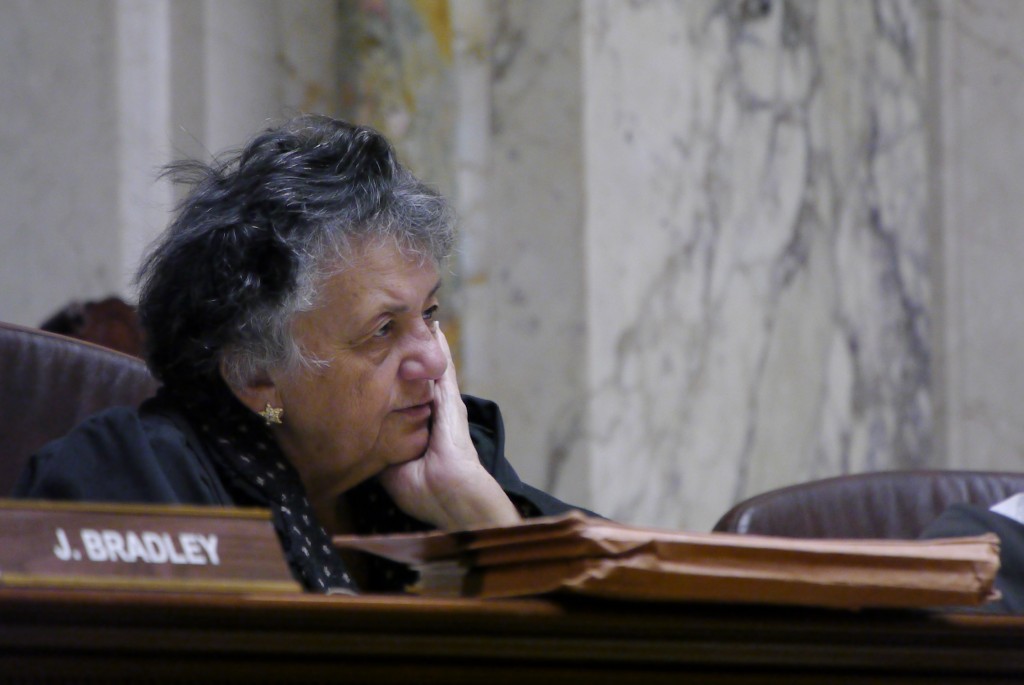Why Shirley Abrahamson Mattered
For decades one of the leading state supreme court judges in the nation.
“She belongs on the Mount Rushmore of Wisconsin Supreme Court justices,” Joe Ehmann, who runs the appellate division of the State Public Defender’s office in Madison, says of the late Wisconsin Supreme Court Justice Shirley Abrahamson, who passed away on Saturday.
“I think of her and Ruth Bader Ginsburg in the same way,” he adds. “I am in awe of and grateful for what each achieved in their extraordinary lives and careers, and miss them both.”
Dean Strang, a prominent criminal defense attorney who has argued before the U.S. Supreme Court places Abrahamson, along with two or three other judges nationwide, as “the leading U.S. state supreme court judge of the second half of the 20th century and the first two decades of this one.”
Beyond the golden resume, Strang adds, “this was a woman who embodied opposing qualities. She was both cold in her assessment of sloppiness, laziness, or mediocrity and warm in her compassion for others. She worked enormously hard — like 15-16 hours a day hard — but appreciated a soft heart and soft word (although not a soft head). She never forgot what it is to be an outsider in a low place, even when she was an insider in some high places.”
Abrahamson remembered her father, a naturalized U.S. citizen, during oral arguments on Wisconsin’s restrictive voter ID law. Her father voted in every election, she said, and kept a framed copy of his citizenship papers by the door. But that wouldn’t have been enough to allow him to vote in Wisconsin anymore after the law passed. He didn’t drive and couldn’t get a copy of his birth certificate from the country he fled when he came here, she said. “Where does he fit in?” she asked the state. The image of her father, and the essential injustice of depriving patriotic Americans like him of the right to vote, loomed over the hearing.
Ehmann first met Abrahamson during law school in 1985 when he was an intern at the Supreme Court. Later, after he began running the State Public Defender’s Madison appellate office he would see her regularly at bar, court, or political functions, and end up chatting in the back of the room “about anything but the law or politics.”
That included where to get the best New York-style pastrami sandwich. (The Chief Justice’s Verdict: the Blowin’ Smoke food cart when it still parked on the Capitol Square).
In preparing for Supreme Court oral arguments, Ehmann says, he would always try to put new or inexperienced lawyers at ease by reminding them they knew much more about their cases than the Justices — except for Abrahamson.
Despite her intimidating knowledge and legendary preparation, Abrahamson “would not ask a gotcha question or put you on the spot,” Ehmann says. “She was very generous in that regard, and if you could get past your nerves, a real pleasure to argue before.”
She would probe, asking deep, respectful questions, sometimes seeking to shore up a response to another justice’s question.
Ehmann describes Justice Abrahamson, both in the courtroom and outside it, as “brilliant, warm, sometimes funny, and always as someone who did not in any way suffer fools. She was the best.”
“The best” is not a term one associates with the current crop of justices on the Wisconsin Supreme Court, alas. And it was Abrahamson’s lot to suffer through years of bitter attacks by colleagues whose intelligence and integrity did not match hers, to put it mildly.
The ugly new era in Wisconsin Supreme Court history began in 2008, with the Willie Horton-style campaign against Louis Butler, the first African American justice on the Court, with a series of dishonest, race-baiting ads. That race made national news both because it was so ugly and because of the way outside money came to play an outsized role in what used to be a low-dollar state race.
We now have a court where the majority banded together to oppose ethics standards that would make justices recuse themselves from cases involving their own campaign donors, who pony up millions to get friendly treatment when they have business before their pet judges.
A few years ago, the increasingly hostile conservative majority on the court managed to oust Abrahamson as Chief Justice.
“A majority of her Court could, and did, change the rules to demote her from Chief Justice,” says Strang. “Neither they nor anyone, though, could demote her from her place as chief among all judges this state has produced to date.”
Somehow, Abrahamson hung in there, going to work every day in what can only be described as a toxic work environment. She was on the front lines as the dangerous, know-nothing politics that have washed over the whole country in recent years reached their peak, threatening to drown the nation’s democratic institutions.
Abrahamson persisted, shining her light in the darkness, answering thuggishness with wisdom, leading by example.
As her many encomiums noted, she blazed a trail for women (who now hold six of seven seats on the Wisconsin Supreme Court, where she was the first woman and first female chief justice). She was first in her law school class — and the only woman. She ran a thriving law practice and was a respected law professor before she joined the Court.
“When she started out, it was hard for her, just like it was hard for Ruth Bader Ginsburg,” says Pines. “But she was so superior intellectually, and had so much drive that, you know, she definitely blazed a trail.”
And she did more than rack up a series of firsts, Jeffrey Mandell, founder and president of the nonprofit law firm Law Forward, points out. “The intersection of her first-rate legal mind and her willingness to go anywhere to sit with the everyday people affected by the Court’s rulings made her a powerful force for justice,” he says.
Mandell argued the last case Abrahamson heard from the bench — on the League of Women Voters’ constitutional challenge to the 2018 lame duck session in which Republican legislative leaders seized powers from the incoming Democratic governor and attorney general.
He remembers that she wasn’t feeling well, and it took her a little while to get to her seat. When the arguments were over, the other justices paid tribute to the fact that it was her last time on the bench, and Abrahamson received a huge standing ovation.
“Standing and applauding — making eye contact with her — being able to be so close to her was a goose-bumps-inducing moment,” Mandell says.
A few months later, the Dane County Bar Association held an event to honor Abrahamson at the Madison Club. “She was in a wheelchair,” Mandell remembers. “I introduced myself and asked if I could speak to her. I asked her a question about the law. It was something that was confusing me about how the court was acting. I said, ‘I don’t understand; they’re saying this but all the precedent says something else.’”
Abrahamson looked ill and tired, as people flocked around greeting her, Mandell remembers. “But she looked at me. As I explained, she started nodding, her eyes lit up and she said, ‘You should keep thinking about that. You should write something.’”
Mandell marvels at “how intellectually engaged in the law she was. Like the old law prof she was, she didn’t give me an easy answer. She said you need to think about that more and write something.” Mandell ended up writing a law review article on the subject.
Katie Dean of the Cap Times reports that Abrahamson was philosophical when her son Daniel came home from Camp Shalom in the summer, upset that his rival, Jill Karofsky, had beaten him in a sports competition yet again: “Girls are just generally smarter and stronger, and you’re just going to have to work harder if you want to keep up,” Daniel Abrahamson said his mother told him.
“Shirley swore me in in 1992 in a private ceremony. It was just the two of us. I had many contacts with her through the years and I will forever be grateful of her support when I ran for both circuit court and the Supreme Court,” Karofsky tweeted.
Abrahamson paved the way for other great women lawyers, and for a nearly all-female Court where Justice Brian Hagedorn is now a minority of one. But no one on the court today really fills Abrahamson’s shoes.
“She was truly exceptional,” says Mandell. “There aren’t many people like that.”
Plus, he adds, the judiciary has become so politicized, becoming a Supreme Court justice is now about being a good politician as much as a great legal mind.
It will take a rare person — someone with Barack Obama’s combination of scholarly legal brilliance and political savvy — to be the next Shirley Abrahamson. But then, Abrahamson was a rare person herself. And she helped shape our understanding of the law and nurture a new generation of passionate, committed lawyers. Wisconsin was very lucky to have her.
Reprinted with permission of Wisconsin Examiner.
Op-Ed
-
Unlocking Milwaukee’s Potential Through Smart Zoning Reform
 Jul 5th, 2024 by Ariam Kesete
Jul 5th, 2024 by Ariam Kesete
-
We Energies’ Natural Gas Plans Are A Mistake
 Jun 28th, 2024 by John Imes
Jun 28th, 2024 by John Imes
-
Milwaukee Needs New Kind of School Board
 Jun 26th, 2024 by Jordan Morales
Jun 26th, 2024 by Jordan Morales























What a lovely tribute to a woman who was treated despicably by her inferiors on the Supreme Court during her last valiant years.
She is indeed on a par with the more famous RBG.
Rest in Peace Justice Shirley Abrahamson.
You have been missed.